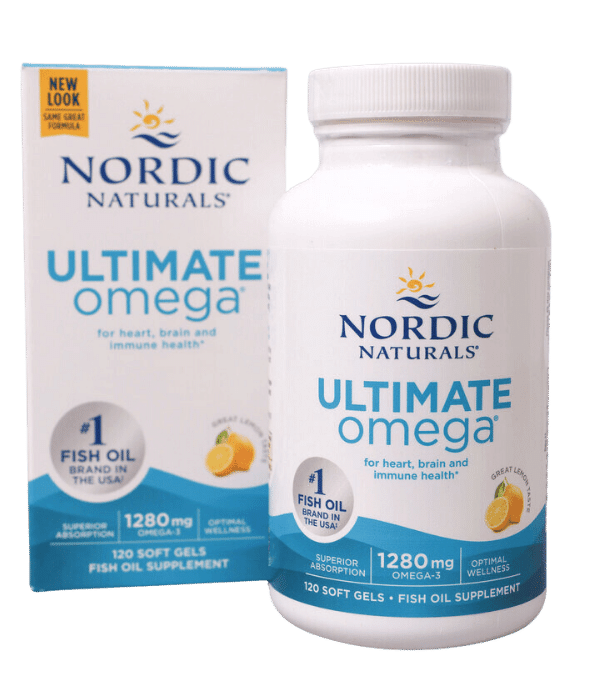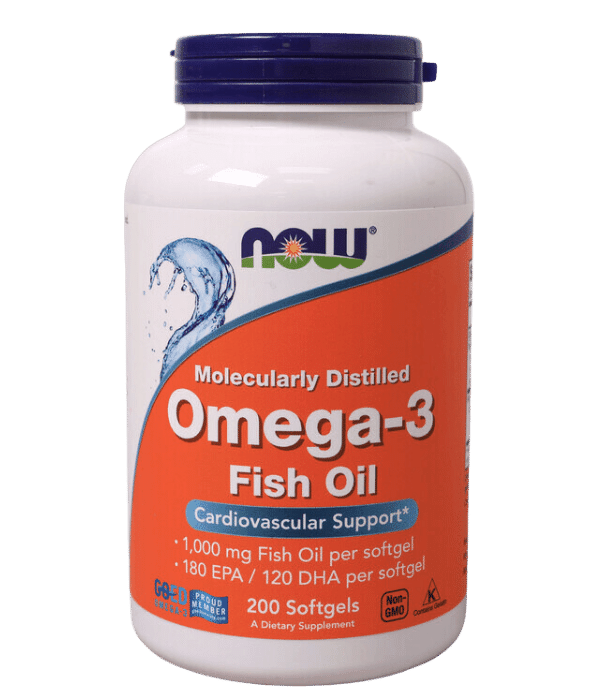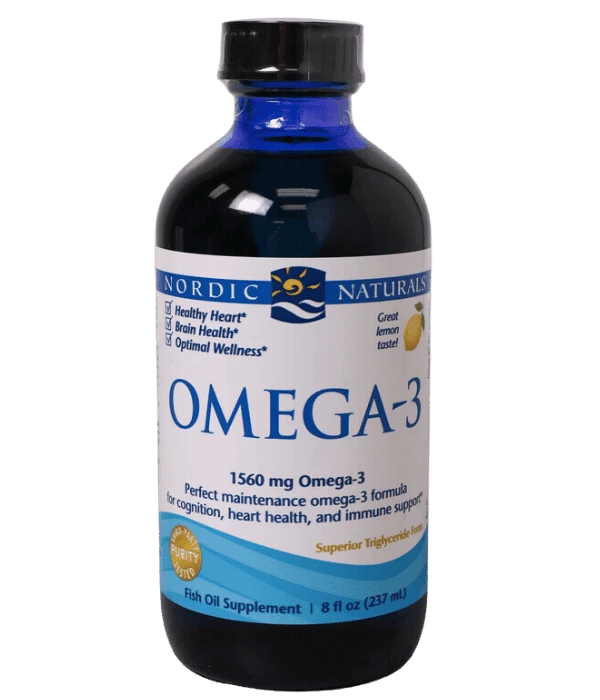Talk to a Registered Dietitian and use INSIDER20 for 20% off!
Talk to a real Dietitian for only $99: Schedule Now
This post contains links through which we may earn a small commission should you make a purchase from a brand. This in no way affects our ability to objectively critique the products and brands we review.
Evidence Based Research To fulfill our commitment to bringing our audience accurate and insightful content, our expert writers and medical reviewers rely on carefully curated research.
Read Our Editorial Policy
As the evidence behind the heart-healthy, cognitive, and inflammation-fighting benefits of omega-3 fats is constantly growing, adding fish oil to your daily routine is a no-brainer—but choosing the right one is far less obvious.
With different sources, varying doses of the primary omega-3 fats (EPA and DHA), and issues of purity and sustainability to think about, it is understandably difficult to pick a fish oil supplement—fortunately, we’ve got you covered.
In this article, check out our list of the seven best fish oil supplements, including our top pick, Nordic Naturals Ultimate Omega, and six others for every situation—whether you’re on a budget, hate taking pills, are dealing with joint pain, or trying to lower your cholesterol.
Get a cholesterol-smart menu crafted for you in a 45-minute consult.
Get a cholesterol-smart menu crafted for you in a 45-minute consult.


Providing the purest and most ethical fish oil, Nordic Naturals takes our top spot with their Ultimate Omega capsules. Their “great lemon taste” more than adequately removes that classic fishy aftertaste and each capsule boasts an ideal amount of EPA and DHA.
Best Overall | Best Budget | Best Tasting | |
|---|---|---|---|
| Product | Nordic Naturals | NOW | Nordic Naturals |
| EPA/DHA Dosage | 650mg EPA, 450mg DHA | 360mg EPA, 240mg DHA | 745mg EPA, 500mg DHA |
| Cost | $49.95 for 60 servings ($0.83 per serving) Shop Now | $19.99 for 100 servings ($0.20 per serving) Shop Now | $25.95 for 48 servings ($0.54 per serving) Shop Now |
Best for: Any adult looking for high-quality fish oil; general heart, inflammation, and mood support.
Our pick for best overall fish oil supplement is the Nordic Naturals Ultimate Omega.
The Nordic Naturals Ultimate Omega is one of the highest-quality fish oils, containing a combined 1,100mg of EPA and DHA sourced from 100% wild-caught sardines and anchovies from Norway and the South Pacific, providing support to heart, brain, and joint health.
With the lemon-flavored soft gels, you can avoid the unpleasant fishy aftertaste commonly found in other fish oil supplements.
According to Nordic Naturals, original research backs their fish oil’s ability to support healthy glucose levels, healthy lipid levels in professional athletes, bronchial health, and the body’s ability to respond to stress in a healthy way.
Nordic Naturals also has a certificate of analysis (COA) available for all products, ensuring their fish oil’s purity and strength.
Plus, Nordic Naturals’ fish oil products are Friend of the Sea Certified, which guarantees the fisheries maintain strict standards for fishing methods, by-catch reduction, and social accountability.
Best for: People looking for an affordable fish oil supplement
The NOW Omega-3 supplement is a perfect choice for people on a budget who don’t want to compromise on quality.
With a decades-long history of providing affordable supplements that have been tested for stability and purity, NOW is a great option for getting a moderate dose of fish oil.
One of the ways that NOW ensures its fish oils’ purity is through molecular distillation, which removes impurities like heavy metals, PCBs, dioxins, saturated fats, and other undesirable compounds while leaving behind only the beneficial components of the fish oil.
And at just $0.20 per serving—and a 3-month serving per bottle—you can’t beat the prices of NOW Omega-3.
Best for: People who prefer liquid over pills and want to avoid any semblance of fishy aftertaste (we don’t blame you).
With highly concentrated levels of EPA and DHA, the Nordic Naturals Omega-3 Liquid is ideal for people who have trouble taking pills.
But don’t think that it will taste like the unpleasant cod liver oil that your great-grandmother tried to get you to take—this liquid omega-3 has a fresh lemon flavor with no fishy remnants.
Even though it has high amounts of omega-3s—1560mg in total—this liquid supplement is still highly affordable, and the triglyceride molecular form of the fish oil may increase absorption to ensure you get the most bang for your buck.
On the downside, this supplement would be tricky to travel with, making it best for at-home omega-3 dosing.
Best for: Adults or teens who have trouble swallowing larger pills.
Wiley’s Finest Wild Alaskan Fish Oil Easy Swallow Minis are the best choice for people who want a pill form of omega-3s—but still don’t like taking them.
With soft gels that are 55% smaller than competitors with the same amount of omega-3s, Wiley’s Finest has managed to concentrate the EPA and DHA into a tiny, easy-to-swallow package.
As this supplement has lower amounts of EPA and DHA than several others on this list, Wiley’s Finest could be a great option for teens who have trouble swallowing pills.
Plus, Wiley’s Finest is a family-owned company that creates their fish oil from sustainable Alaskan fish, and every batch is tested for harmful contaminants like mercury, PCBs, heavy metals, and radiation.
Best for: People who don’t like pills; people who want individually-sealed supplements for travel or on-the-go.
For people who like their supplements to taste like candy, Nordic Naturals Ultimate Omega Gummy Chews are the perfect option.
Despite their tasty tropical fruit flavor, these gummies have zero sugar and are sweetened with stevia, xylitol, and erythritol.
Although they are on the expensive side, the Nordic Naturals gummies pack a ton of EPA and DHA in each serving, totaling 1200mg of omega-3s to support heart, brain, and immune health.
Best for: People with high cholesterol or looking for extra cardiovascular support
If you have high cholesterol or other heart health concerns, the Nordic Omega LDL may be the right pick for you.
With 1152mg total omega-3s, 1200mg of red yeast rice powder, and 30mg of coenzyme Q10 (CoQ10), this supplement is loaded with ingredients that may reduce LDL (“bad”) cholesterol and improve heart health.
Red yeast rice has been found to support healthy cholesterol levels and cardiovascular and blood vessel function, while CoQ10 is an antioxidant that can protect cardiovascular cells from oxidative stress—the buildup of free radicals and reactive oxygen species that damage cells and DNA.
However, this supplement is quite expensive and only carries 20 servings per container, which may not be a sustainable option for many people.
Best for: People with joint pain or other inflammation-related conditions.
Lastly, the Nordic Omega Curcumin combines fish oil, curcumin, and the antioxidant glutathione to provide potent anti-inflammatory and antioxidant activity.
Curcumin is the primary bioactive compound found in turmeric and has been well-studied for its role in fighting inflammation and reducing cellular damage—which can help with joint pain and disorders.
Plus, the addition of glutathione further supports cellular health, as this compound is our body’s most abundant antioxidant.
According to Nordic Naturals, the Omega Curcumin supplement “provides a foundation for cellular health and recovery.”
While this is the most expensive omega-3 supplement on our list, the addition of curcumin and glutathione—which are not inexpensive supplements—may make it worthwhile for people dealing with inflammatory conditions to get a 3-in-1 combination supplement.
Not all fish oil supplements are created equal.
Many on the market are made with oxidized or rancid fish oil or have poor quality ingredients added, which can have a detrimental effect on your health.
Fish oil is one of the most important supplements to do your homework with—consider these factors when purchasing:
Yes, high-quality fish oil supplements with adequate doses of EPA and DHA are thought to be good for your health.
Specifically, omega-3 fats are thought to be beneficial for cardiovascular, metabolic, and immune health, and possibly cognitive function and mood.
Research hasn’t consistently shown that fish oil supplements reduce the risk of heart disease.
However, fish oil or omega-3s have shown promise for reducing risk factors of cardiovascular disease, including high blood pressure, arrhythmias, high cholesterol, and atherosclerosis—the buildup of plaque in arteries that causes arterial thickening or hardening.
The best fish oil supplements to take are those emphasizing purity, EPA and DHA potency, sustainability, freshness, and bioavailability.
Our favorite fish oil brand is Nordic Naturals.
Fish oil is most likely safe for most people to take every day.
However, people with severe seafood allergies may want to get their omega-3s from a plant-based source, like algae.
Also, as fish oil has a blood-thinning effect—which is why it’s helpful for cardiovascular health—people with bleeding disorders or liver disease can have an increased risk of bleeding from fish oil.
Yes, you can take too much fish oil.
The FDA recommends not exceeding exceed 3g per day of EPA and DHA combined from all sources, with no more than 2g per day deriving from fish oil or omega-3 supplements.
A fish oil supplement is high-quality if:
● It shows evidence of third-party testing for heavy metals and contaminants
● Has more than 250mg each of EPA and DHA (ideally 1,000mg combined)
● Uses sustainably sourced fish
● Has measures in place to ensure freshness and prevention of oxidation.
People with severe seafood allergies may want to avoid fish oil.
Also, people with bleeding disorders or liver disease can have an increased risk of bleeding from fish oil.
Lastly, people on anticoagulant medications (blood thinners) should discuss the use of omega-3 or fish oil supplements with their healthcare provider.
Albert BB, Cameron-Smith D, Hofman PL, Cutfield WS. Oxidation of marine omega-3 supplements and human health. Biomed Res Int. 2013;2013:464921. doi:10.1155/2013/464921
Cicero AFG, Fogacci F, Banach M. Red Yeast Rice for Hypercholesterolemia. Methodist Debakey Cardiovasc J. 2019;15(3):192-199. doi:10.14797/mdcj-15-3-192
Hewlings SJ, Kalman DS. Curcumin: A Review of Its Effects on Human Health. Foods. 2017;6(10):92. Published 2017 Oct 22. doi:10.3390/foods6100092
Lee JH, O’Keefe JH, Lavie CJ, Marchioli R, Harris WS. Omega-3 fatty acids for cardioprotection. Mayo Clin Proc. 2008;83(3):324-332. doi:10.4065/83.3.324
Martí Del Moral A, Fortique F. Omega-3 fatty acids and cognitive decline: a systematic review. Omega-3 y deterioro cognitivo: una revisión sistemática. Nutr Hosp. 2019;36(4):939-949. doi:10.20960/nh.02496
Neubronner J, Schuchardt JP, Kressel G, Merkel M, von Schacky C, Hahn A. Enhanced increase of omega-3 index in response to long-term n-3 fatty acid supplementation from triacylglycerides versus ethyl esters. Eur J Clin Nutr. 2011;65(2):247-254. doi:10.1038/ejcn.2010.239
Rabanal-Ruiz Y, Llanos-González E, Alcain FJ. The Use of Coenzyme Q10 in Cardiovascular Diseases. Antioxidants (Basel). 2021;10(5):755. Published 2021 May 10. doi:10.3390/antiox10050755
Schwalfenberg G. Omega-3 fatty acids: their beneficial role in cardiovascular health. Can Fam Physician. 2006;52(6):734-740.
Swanson D, Block R, Mousa SA. Omega-3 fatty acids EPA and DHA: health benefits throughout life. Adv Nutr. 2012;3(1):1-7. doi:10.3945/an.111.000893